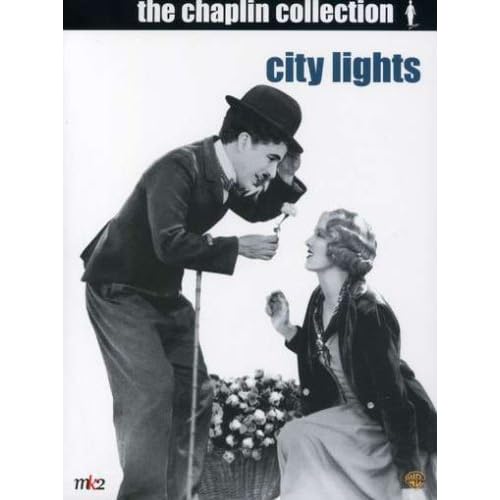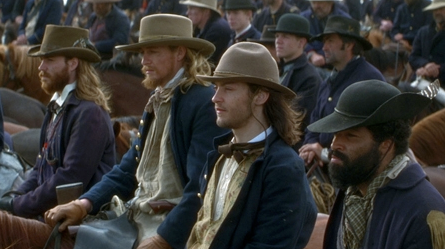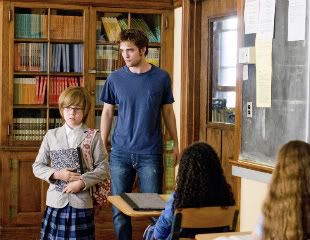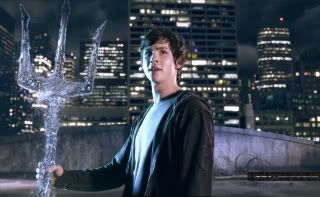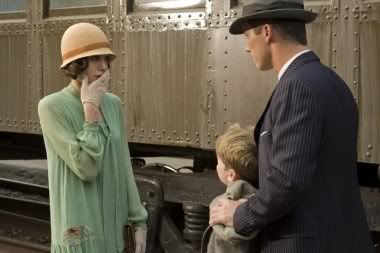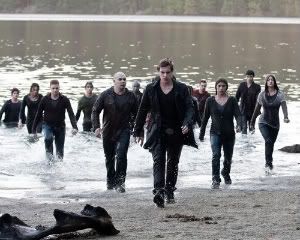St. Elmo's Fire (Joel Schumacher, 1986)

The Brat Pack attempts to grow up with varying degrees of success. Demi Moore is so superficial that her big "reveal" about why she behaves the way she does is totally predictable, and I really wanted to shove Rob Lowe's sax down his throat after he went into about the fifth minute of his solo at the club where his band was playing. On the other hand, those scenes were sorta entertaining in an embarrassing way, and it's almost surreal how much the whole film comes across as highly-watchable, especially poor Emilio Estevez and his pursuit of older Andie MacDowell and "gay" Andrew McCarthy finally hooking up with the love of his life, Ally Sheedy. In fact, besides the Estevez scenes up at the snowbound cabin, the scenes where Sheedy and her lover Judd Nelson "attempt" to divide up their records while breaking up is a highlight. The film begins as if it's on both poppers and speed but eventually a semblance of plot and logic arises, at least if you can take it long enough for that to occur.
Signs (M. Night Shyamalan, 2002)

This film still delivers some chills and laughs, but it seems that every time I rewatch a Shyamalan flick, it seems much slower and much-less complex. These mysterious crop circles do turn out to be created by space aliens and not by weird neighbors, but these aliens do not really have all that much of a personality, and they don't seem to satisfy any purpose except to help Mel Gibson's family come to terms with a family death and bring back a semblance of normalcy to a troubled family. Sure, there are some suspense scenes and a few humorous ones, but they seem to come more from what people do not know than what they do know. Once everything becomes crystal clear, the charm and originality of the flick seems to evaporate too. However, it's still vastly superior to Night's latest flicks.
Rudy (David Anspaugh, 1993)
 Hey Powdered Water, you have no excuse not to watch this flick, no matter how much you "hate" Notre Dame.
Hey Powdered Water, you have no excuse not to watch this flick, no matter how much you "hate" Notre Dame. The entire film comes across as utterly preposterous [in concept, not in presentation], but it's all based on a true story and really knows how to push all the buttons in how to make a sports fan or an underdog lover get completely drawn into the story of Rudy (Sean Astin), a small, scholastically-underachieving teenager with the biggest heart in the world, who will stop at nothing to succeed in his dream of becoming a Notre Dame football player during an actual game. Besides his father (Ned Beatty), Rudy is also pursuing his dream for a chubby brainiac (Jon Favreau) and a Notre Dame stadium employee (Charles S. Dutton) who once played football for the team. Jerry Goldsmith's beautiful theme music builds subtly from the opening credits to produce chills during the tear-filled finale.
La Dolce Vita (Federico Fellini, 1960)
; Art House Rating:

Fellini fashions his own completely-unique film about empty journalist Marcello (Marcello Mastroianni) who follows other empty people around Rome and writes up their lives for the even emptier "regular people" to feed upon in a way to forget about their own lives. (It kinda reminds me of what's happening now with Lindsay Lohan and Mel Gibson.) The film is incredibly episodic, and while most of it is very realistic, there are occasional flourishes where time and location seem to disappear effortlessly under Fellini's masterful direction. The film does eventually add up to something powerful, but while you're watching the entire three hours, I can understand how it might bother and/or bore some viewers, but for those willing to look carefully and connect the dots, the final few scenes are actually quite powerful in offering up Fellini's own interpretation of fellow Italian auteur Antonioni's theme of people living alone and unable to communicate. The fate of Msrcello's friend Steiner (Alain Cuny) and that of the giant manta ray at the end could only be conceived by a man who was deeply living in a world he felt was almost a vacuum yet desired to communicate, however seemingly-haphazardly, with humankind.
 EDIT
EDIT - I forgot to mention that Nico can be seen in the film. She has a very small part, and I suppose she's actually playing herself (her name is Nicolina), but many of the actors are actually playing characters with their own names. Anyway, if you've never noticed Nico in the movie, she has a scene in the car with Marcello and a few others and she begins to speak with a Teutonic accent, exactly the same way she "sings" on the
Velvet Underground and Nico record. She is obviously speaking German, but when Marcello asks her what language it is, she responds "Eskimo". Not really too much to say, but something fun for those who care about such pop culture trivialities.
The Trouble with Harry (Alfred Hitchcock, 1955)
+ 
Hitch gleefully spins a tale about a dead body that almost everybody believes was personally killed by them and gets buried and unburied over and over. Yes, the film is a black comedy, but it does have plenty of trademark Hitchcock suspense as well as some of the funniest dialogue you'll ever hear. It takes place in New England during the fall, and Brenda and I both agree that it's probably the film which most resembles what our honeymoon looked like with all those striking autumnal colors. I don't want to get into too many details, but Harry causes trouble for an elderly hunter (Edmund Gwenn), a spinster (Mildred Natwick) who likes him, a painter (John Forsythe) with a devilish tongue, and a pretty young mother (Shirley MacLaine). This is not only the first Hitchcock film with a Bernard Herrmann score, but it's also MacLaine's film debut and an early flick for the boy (Jerry Mathers, the Beave from "
Leave it to Beaver") who plays her son and steals all his scenes. It may take just a little bit to really get going, but this film is generally underrated in the Hitchcock oeurve.
Step Brothers (Adam McKay, 2008)

Supremely-idiotic comedy with equally-moronic characters and situations results in nothing less than a funny, laugh-out-loud flick about competing 40-ish stay-at-home sons who become part of the same family when their parents marry. The fact that the characters played by Will Ferrell and John C. Reilly probably have IQs which total together less than one-half of what one of them weighs shouldn't be held against the movie. Of course, if you don't like a film such as
There's Something About Mary, you should probably steer clear, but this thing has tons of gross-out gags along with a few actual sophisticated touches which seem to have been added as almost an afterthought. Mary Steenburgen and Richard Jenkins are solid as the parents, and Adam Scott is appropriately-hateful as the successful younger brother of Ferrell. I don't really relate to it on a personal level but it certainly has no problems going in bizarre uncharted waters quite often, so I give it points for that.
The Battle at Apache Pass (George Sherman, 1952)

This is something akin to a sequel to the 1950 James Stewart western
Broken Arrow where Jeff Chandler also played Cochise. In this film, Cochise has made peace with the White Eyes, but Geronimo (Jay Silverheels) and some corrupt Indian agents conspire to bring about a full-fledged war when the cavalry commander (John Lund) is away from his fort. Much of the film was shot in and around Monument Valley and there are some decent action scenes, but overall, it's just a fair-to-middling western which looks particularly good. It's fun to see "Tonto" playing Geronimo but there could have been a few more confrontations between him and Cochise. Two years after this film, Douglas Sirk directed a pretty good sequel called
Taza, Son of Cochise which starred Rock Hudson in the title role.
My Name is Julia Ross (Joseph Lewis, 1945)

This resembles a low-budget Hitchcock film where Julia Ross (Nina Foch) answers an ad for a live-in secretary and finds herself in the middle of a plot to seemingly kill her so that a woman (Dame May Whitty) and her psycho son (George Macready) can collect on an inheritance which they cannot get now because Mr. Psycho already went crazy and murdered his real wife. So the family takes her to a seaside mansion, drugs her and tries to convince her that she's really the wife. Julia isn't buying any of it, but nobody knows who she is, including some of the new servants and local townspeople, so she comes across as insane to everybody else. The film is very short, but it manages to build up some nice suspense touches and Macready is an excellent psycho who enjoys destroying things with knives.
Faust (F.W. Murnau, 1926)
; Classic Rating:

Murnau's final German film before he moved on to Hollywood is a great blend of spectacle and special effects, especially in the first half. It's a classic story of Good vs. Evil, not all that unlike the
Book of Job, where Mephisto [the Devil] (Emil Jannings) bets God that he can turn God-fearing, good man Faust (Gösta Ekman) into an unrepentant sinner if given a free hand. Faust wants youth and is especially attracted to a beautiful innocent (Camilla Horn). Eventually, her brother (William Dieterle) does battle for her honor with Faust in a scene reminiscent of Shakespeare's far-later
Romeo and Juliet. The opening combines every imaginable use of sets, costumes, F/X, trippy editing and storytelling skill which Fritz Lang would later try to improve upon in the next year's
Metropolis. The second half of the film which tells how Faust falls a bit short in his purity is entertaining but not as mesmerizing as the earlier scenes. However, it's very interesting to see Dieterle acting in this film before he moved to the U.S. to become a significant director and make his own Americanized version of this tale, the wonderful
The Devil and Daniel Webster (1941). Sneak Previews: I watched about 75% of Tom Tykwer's
The International on cable and will try to catch the remainder the next time it plays (probably this weekend).

I also watched the first three-fourths of Tom Ford's
A Single Man before Brenda had to crash. Those write-ups will appear next time.
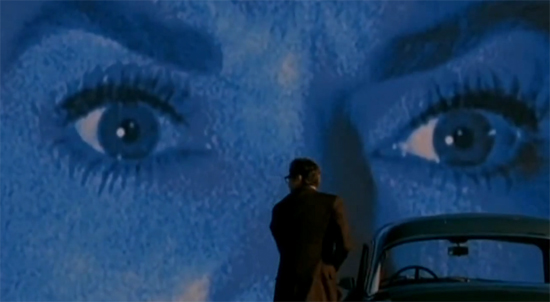















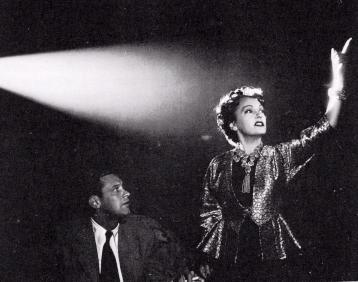


 Pretty excellent monster thriller with a very Japanese shade of comedy (ironic, given that this is a South Korean picture). I love the lack of apprehension at showing the creature or his faculties. Sometimes, we just want to see the damn thing. It did slow up and become a little dragged somewhere in the middle act, and there were some minor holes in plot. But the characters were both fun and believable, the monster was awesome, and the ending really satisfied.
Pretty excellent monster thriller with a very Japanese shade of comedy (ironic, given that this is a South Korean picture). I love the lack of apprehension at showing the creature or his faculties. Sometimes, we just want to see the damn thing. It did slow up and become a little dragged somewhere in the middle act, and there were some minor holes in plot. But the characters were both fun and believable, the monster was awesome, and the ending really satisfied.











